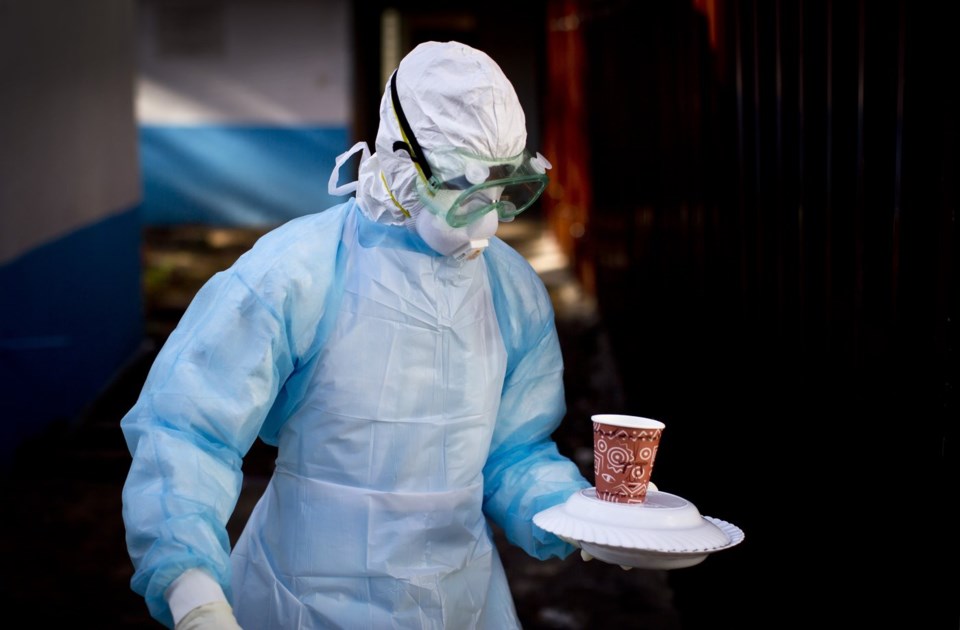KIGALI, Rwanda (AP) — Marburg hemorrhagic fever has killed 11 people in Rwanda, health authorities said Thursday, as the East African country searches for the source of an outbreak first traced among patients in health facilities.
There are 36 confirmed cases of the disease that manifests like Ebola, with 25 of them in isolation, according to the Rwandan government's latest update.
Rwanda declared the outbreak on Sept. 27 and reported six deaths a day later. Authorities said at the time that the first cases had been found among patients in health facilities and that an investigation was underway “to determine the origin of the infection.”
The source remains unclear, raising contagion fears in the small central African nation. Isolating patients and their contacts is key to stopping the spread of viral hemorrhagic fevers like Marburg.
The World Health Organization has warned that cases in Kigali, the Rwandan capital, pose a risk of international spread because the city has an international airport and is connected by road to other cities in East Africa.
“WHO assesses the risk of this outbreak as very high at the national level, high at the regional level and low at the global level,” WHO Director-General Tedros Adhanom Ghebreyesus said at a regular briefing on Thursday, referring to the Marburg outbreak in Rwanda.
Testifying to growing international concern about the outbreak, two people were isolated in the northern German city of Hamburg after returning from Rwanda, where they had been in a medical facility with Marburg virus patients, the European Center for Disease Prevention and Control said in a statement on Thursday.
Both tested negative for the virus, the ECDC statement said.
German media reports said that concern about the virus led authorities to cordon off two tracks at a railway station where the two people had arrived. One was a young medical student who had felt symptoms of the disease and contacted doctors from the train.
In Rwanda, most of the affected people are health care workers across six out of 30 districts in Rwanda. Some patients live in districts bordering Congo, Burundi, Uganda and Tanzania, according to WHO.
At least 300 people who came into contact with those confirmed to have Marburg have been identified, and an unspecified number of them are in isolation facilities, according to Rwandan health authorities.
Rwandan Health Minister Sabin Nsanzimana said Thursday that the clinical trials for vaccination would start “within days” but failed to clarify which type of vaccine will be used.
He told journalists at an Africa Centers for Disease Control and Prevention briefing that Rwanda is screening everyone who presents fever, head and body ache symptoms and has so far tested 2,000 people with 5,000 more test kits expected to arrive in the country.
Rwandans have been urged to avoid physical contact to help curb the spread. Strict measures include the suspension of school and hospital visits as well as a restriction on the number of those who can attend funerals for Marburg victims. Home vigils aren't allowed in the event a death is linked to Marburg.
The U.S. Embassy in Kigali has urged its staff to work remotely and avoid visiting offices.
Like Ebola, the Marburg virus is believed to originate in fruit bats and spreads between people through close contact with the bodily fluids of infected individuals or with surfaces, such as contaminated bed sheets. Without treatment, Marburg can be fatal in up to 88% of people who fall ill with the disease.
Symptoms include fever, muscle pains, diarrhea, vomiting and, in some cases, death through extreme blood loss. There is no authorized vaccine or treatment for Marburg.
Marburg outbreaks and individual cases have in the past been recorded in Tanzania, Equatorial Guinea, Angola, Congo, Kenya, South Africa, Uganda and Ghana, according to WHO.
The virus was first identified in 1967 after it caused simultaneous outbreaks of disease in laboratories in Marburg, Germany and Belgrade, Serbia. Seven people died after being exposed to the virus while conducting research on monkeys.
___
Jamey Keaten contributed to this report from Geneva.
Ignatius Ssuuna, The Associated Press




